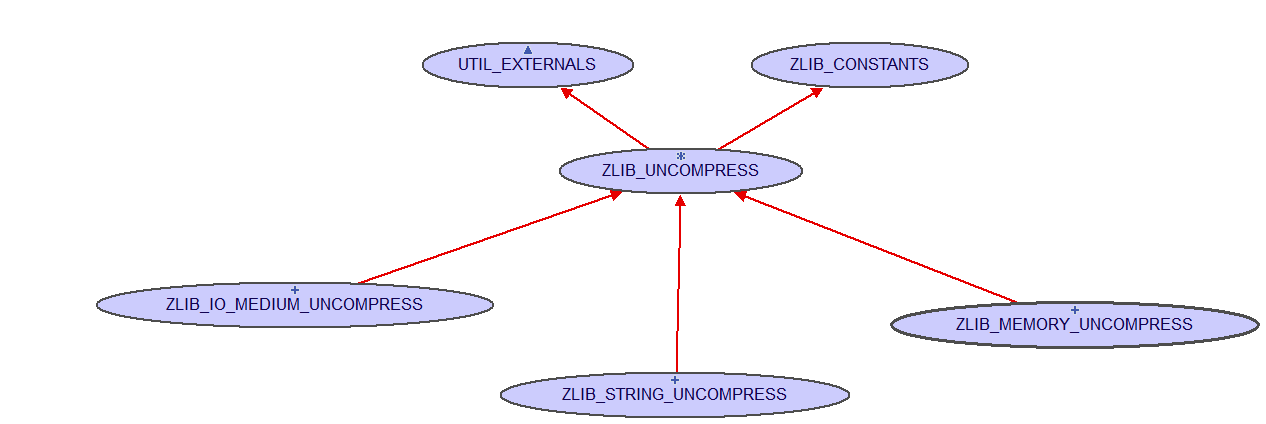Eiffel Zlib is a wrapper on top of C Zlib library, the Eiffel code is based on an old Eiffel library updated to the latest Eiffel version. Zlib is a C library use for data compression, in most of the cases you will find a Zlib version for your target platform.
Note: the Zlib library is under development so maybe the API change in the future.
Don’t hesitate to send suggestions and improvements.
Getting Started
Checkout the library.
svn co https://svn.eiffel.com/eiffelstudio/trunk/Src/unstable/library/compression/zlib/
The library will be available with the next EiffelStudio release 14.05
API overview
The current library does not support everything, It comes with all the basic functions (deflate, deflateEnd, inflate, inflateEnd and version), and the most common utility functions (gzread, gzwrite, gzclose, gzopen).
Also the library has classes to work with ZLIB_COMPRESS and ZLIB_UNCOMPRESS
ZLIB_COMPRESS class hierarchy.
ZLIB_UNCOMPRESS class hierarchy.
Examples
Simple examples using the new interface
IO_MEDIUM
stream_example_file_to_file2
-- Example using IO_MEDIUM.
local
zi: ZLIB_IO_MEDIUM_UNCOMPRESS
zo: ZLIB_IO_MEDIUM_COMPRESS
l_file: FILE
l_src_file: FILE
l_new_file: FILE
do
create {RAW_FILE}l_file.make_create_read_write ("new_test2.txt")
create {RAW_FILE}l_src_file.make_open_read (source_file)
create {RAW_FILE}l_new_file.make_create_read_write ("new_file2.txt")
create zo.io_medium_stream (l_file)
zo.put_io_medium (l_src_file)
create {RAW_FILE}l_file.make_open_read ("new_test2.txt")
create zi.io_medium_stream (l_file)
zi.to_medium (l_new_file)
print ("%NBytes compresses:" + zo.total_bytes_compressed.out)
print ("%NBytes uncompresses:" + zi.total_bytes_uncompressed.out)
end
STRING
stream_example_string_2
local
di: ZLIB_STRING_UNCOMPRESS
dc: ZLIB_STRING_COMPRESS
input_string: STRING
output_string: STRING
do
input_string:= "[
zlib is designed to be a free, general-purpose, legally unencumbered -- that is, not covered by any patents -- lossless data-compression library for use on virtually any computer hardware and operating system. The zlib data format is itself portable across platforms. Unlike the LZW compression method used in Unix compress(1) and in the GIF image format, the compression method currently used in zlib essentially never expands the data. (LZW can double or triple the file size in extreme cases.) zlib's memory footprint is also independent of the input data and can be reduced, if necessary, at some cost in compression. A more precise, technical discussion of both points is available on another page.
zlib was written by Jean-loup Gailly (compression) and Mark Adler (decompression). Jean-loup is also the primary author/maintainer of gzip(1), the author of the comp.compression FAQ list and the former maintainer of Info-ZIP's Zip; Mark is also the author of gzip's and UnZip's main decompression routines and was the original author of Zip. Not surprisingly, the compression algorithm used in zlib is essentially the same as that in gzip and Zip, namely, the `deflate' method that originated in PKWARE's PKZIP 2.x.
Mark and Jean-loup can be reached by e-mail at zlib email address. Please read the FAQ and the manual before asking us for help. We are getting too many questions which already have an answer in the zlib documentation.
Greg, Mark and/or Jean-loup will add some more stuff here when they think of something to add. For now this page is mainly a pointer to zlib itself and to related links. Note that the deflate and zlib specifications both achieved official Internet RFC status in May 1996, and zlib itself was adopted in version 1.1 of the Java Development Kit (JDK), both as a raw class and as a component of the JAR archive format.
The lovely zlib-vise image above was provided courtesy of Bruce Gardner, art director of Dr. Dobb's Journal. It appears in Mark Nelson's article in the January 1997 issue (see below).
]"
create output_string.make_empty
create dc.string_stream (output_string)
dc.put_string (input_string)
create di.string_stream (output_string)
check
same_string: input_string.same_string (di.to_string)
end
print ("%NBytes compresses:" + dc.total_bytes_compressed.out)
print ("%NBytes uncompresses:" + di.total_bytes_uncompressed.out)
end
MEMORY
stream_example_memory
local
zi: ZLIB_MEMORY_UNCOMPRESS
zo: ZLIB_MEMORY_COMPRESS
input_buffer: ARRAY[NATURAL_8]
output_buffer: MANAGED_POINTER
new_buffer: ARRAY[NATURAL_8]
output: MANAGED_POINTER
do
input_buffer := <<1,2,3,4,5,6,7,8,9,10,11,12,13,14,15,16,17,18,19,20,21,22,23,24,25,26,27,28,29,30,31,32,33,34,35,36,37,38,39,40,41,42,43,44,45,46,49,90,
1,2,3,4,5,6,7,8,9,10,11,12,13,14,15,16,17,18,19,20,21,22,23,24,25,26,27,28,29,30,31,32,33,34,35,36,37,38,39,40,41,42,43,44,45,46,49,90,
1,2,3,4,5,6,7,8,9,10,11,12,13,14,15,16,17,18,19,20,21,22,23,24,25,26,27,28,29,30,31,32,33,34,35,36,37,38,39,40,41,42,43,44,45,46,49,90,
1,2,3,4,5,6,7,8,9,10,11,12,13,14,15,16,17,18,19,20,21,22,23,24,25,26,27,28,29,30,31,32,33,34,35,36,37,38,39,40,41,42,43,44,45,46,49,90,
1,2,3,4,5,6,7,8,9,10,11,12,13,14,15,16,17,18,19,20,21,22,23,24,25,26,27,28,29,30,31,32,33,34,35,36,37,38,39,40,41,42,43,44,45,46,49,90,
1,2,3,4,5,6,7,8,9,10,11,12,13,14,15,16,17,18,19,20,21,22,23,24,25,26,27,28,29,30,31,32,33,34,35,36,37,38,39,40,41,42,43,44,45,46,49,90,
1,2,3,4,5,6,7,8,9,10,11,12,13,14,15,16,17,18,19,20,21,22,23,24,25,26,27,28,29,30,31,32,33,34,35,36,37,38,39,40,41,42,43,44,45,46,49,90,
1,2,3,4,5,6,7,8,9,10,11,12,13,14,15,16,17,18,19,20,21,22,23,24,25,26,27,28,29,30,31,32,33,34,35,36,37,38,39,40,41,42,43,44,45,46,49,90
>>
create output_buffer.make (128)
create zo.memory_stream (output_buffer)
zo.put_memory (create {MANAGED_POINTER}.make_from_array (input_buffer))
create zi.memory_stream (output_buffer)
output := zi.to_memory
new_buffer := output.read_array (0, output.count)
new_buffer.compare_objects
input_buffer.compare_objects
check
same_content: new_buffer.is_equal (input_buffer)
end
print ("%NBytes compresses:" + zo.total_bytes_compressed.out)
print ("%NBytes uncompresses:" + zi.total_bytes_uncompressed.out)
end
You can check the examples here https://svn.eiffel.com/eiffelstudio/trunk/Src/unstable/library/compression/zlib/example/.


